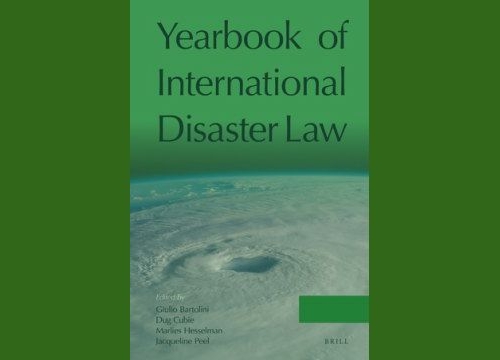Book Launch: Yearbook of International Disaster Law
Event


Brill
Disasters caused by natural and technological hazards are a commonplace phenomenon causing extensive negative impacts as exemplified by the World Disasters Report elaborated by the International Federation of Red Cross and Red Crescent Societies (IFRC). According to this report, in the last decade around 770,000 deaths can be attributed to disasters, while 2 billion people have been affected and damages have amounted to US$1,65 trillion.
On the occasion of the launch of the Yearbook of International Disaster Law (Brill, 2019) edited by Giulio Bartolini (Editor-in-Chief), Dug Cubie, Marlies Hesselmann and Jacqueline Peel, this panel will address current legal, policy and operational challenges raised by disasters for states, international organizations, NGOs and affected communities providing academic and stakeholders’ perspectives on the role of law in disasters.
This panel is co-organized with the IFRC’s Disaster Law Programme and in cooperation with the Jean Monnet Project ‘Disseminating Disaster Law for Europe’ at Roma Tre University.
INTRODUCTORY WORDS
- Cécile Aptel, Director of the Policy, Strategy and Knowledge Department, IFRC
- Marco Sassòli, Director, Geneva Academy, Professor of International Law, University of Geneva
MODERATION
- Giulio Bartolini, Associate Professor of International Law, Roma Tre University, Editor-in-Chief of the Yearbook of International Disaster Law
PANELISTS
- Gian Luca Burci, Adjunct Professor of International Law, Director of the Joint LLM in Global Health Law and Governance, Graduate Institute of International and Development Studies
- Dug Cubie, Lecturer, University College Cork, Editor of the Yearbook of International Disaster Law
- Isabelle Granger, Global Legislative Advocacy Coordinator, IFRC
- Walter Kaelin, Professor Emeritus for International and Constitutional Law, University of Bern, Envoy of the Chair of the Platform on Disaster Displacement
- Alice Sironi, Migration Law Specialist, International Organization for Migration (IOM)
RECEPTION
The panel will be followed by a light reception offered by the IFRC’s Disaster Law Programme.
ABOUT THE BOOK
The aim of the Yearbook of International Disaster Law is to foster the interest of academics and practitioners on legal and institutional issues relevant to all forms of natural, technological/human-made disasters, including rapid and slow onset events. The Yearbook will primarily address the international law dimension of relevant topics, alongside important regional and national dimensions relevant for the further development of legal and policy initiatives. Papers related to the section ‘International Disaster Law in Practice’ are made available as open-access sources.









